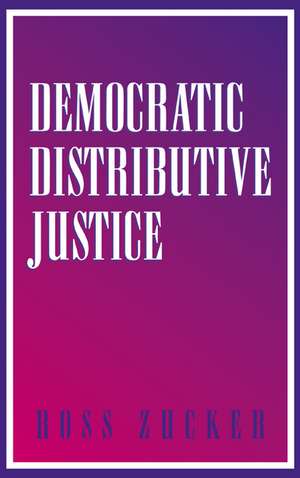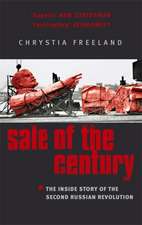Democratic Distributive Justice
Autor Ross Zuckeren Limba Engleză Hardback – 3 dec 2000
| Toate formatele și edițiile | Preț | Express |
|---|---|---|
| Paperback (1) | 288.80 lei 43-57 zile | |
| Cambridge University Press – 13 iul 2003 | 288.80 lei 43-57 zile | |
| Hardback (1) | 725.14 lei 43-57 zile | |
| Cambridge University Press – 3 dec 2000 | 725.14 lei 43-57 zile |
Preț: 725.14 lei
Preț vechi: 843.19 lei
-14% Nou
Puncte Express: 1088
Preț estimativ în valută:
138.78€ • 144.50$ • 117.28£
138.78€ • 144.50$ • 117.28£
Carte tipărită la comandă
Livrare economică 10-24 martie
Preluare comenzi: 021 569.72.76
Specificații
ISBN-13: 9780521790338
ISBN-10: 0521790336
Pagini: 348
Ilustrații: 6 tables
Dimensiuni: 163 x 238 x 27 mm
Greutate: 0.68 kg
Ediția:New.
Editura: Cambridge University Press
Colecția Cambridge University Press
Locul publicării:New York, United States
ISBN-10: 0521790336
Pagini: 348
Ilustrații: 6 tables
Dimensiuni: 163 x 238 x 27 mm
Greutate: 0.68 kg
Ediția:New.
Editura: Cambridge University Press
Colecția Cambridge University Press
Locul publicării:New York, United States
Cuprins
Acknowledgements; 1. Democracy and economic justice; Part I. Unequal Property and Individualism in Liberal Theory: 2. The underlying logic of liberal property theory; 3. Unequal property and its premise in Locke's theory; 4. Unequal property and individualism, Kant to Rawls; Part II. Egalitarian Property and Justice as Dueness: 5. Whose property is it, anyway?; 6. The social nature of economic actors and forms of equal dueness; 7. Policy reflections: the effect of an egalitarian regime on economic growth; Part III. Egalitarian Property and the Ethics of Economic Community: 8. Deriving equality from community; 9. The dimension of community in capital-based market systems: between consumers and producers; 10. Endogenous preferences and economic community; 11. The dimension of community in capital-based market systems: between capital and labour; 12. The right to an equal share of part of national income; Part IV. Democracy and Economic Justice; 13. Democratic distributive justice; 14. Democracy and economic rights; Conclusions; References; Index.
Recenzii
'Democratic Distributive Justice is a most impressive work that demonstrates unusual originality and creativity, not to say considerable courage. His … carefully crafted argument challenges a broad range of philosophical and ideological perspectives. At the same time, however, his presentation is always measured in tone, carefully reasoned, and persuasive. Provocative it may be, but it is too well argued to be ignored or dismissed. We have needed such a work. If it achieves the success it deserves, in a few years Ross Zucker will be known as one among the important contemporary scholars who have contributed significantly to our understanding of democracy, equality, property, and justice.' Robert Dahl, Yale University
'Ross Zucker has written a … thought-provoking book on the relationship between income distribution, rights, and democratic community. In it, he offers a powerful argument for a more egalitarian distribution of income. He also offers numerous penetrating observations on popular and influential theories of distribution, indicating clearly how they relate to his own. This is a rewarding and challenging book both for those who find themselves convinced by its central argument and those who remain sceptical.' David P. Levine, University of Denver
'Ross Zucker offers a … social-relations approach to the distribution of property within a framework of democratic justice. As a social relations account of property, it seems to me the best of its kind. Zucker also inventively links the distribution of property and the theory of democracy. His arguments are deployed with a striking command of the literature in philosophy, economics, and political theory.' Stephen R. Munzer, UCLA School of Law
'This thoughtful and highly original book addresses an important issue in political philosophy - the question of what principles underlie a just distribution of income and wealth. Ross Zucker argues the intrinsically interdependent character of economic activity establishes a principles of distributive justice that entitles every participant in the economy to an equal share of part of the income and wealth generated by that activity. Zucker builds his novel case for egalitarianism on careful logic, against the background off a first-rate critical survey of the philosophical literature on property rights from Locke to Rawls. This book should spark a lively debate on a topic that, in this age of widening inequality, is more relevant than perhaps ever before.' Gary Mongiovi, co-editor of Review of Political Economy
'This book should be required reading for anyone, regardless of ideological perspective, who wishes to obtain a comprehensive understanding of capitalism in modern democracy.' Choice
'… a challenging contribution to contemporary political and economic theory.' Political Studies
'The book is erudite, closely reasoned and tightly written, and its tone engaged and serious … Zucker's thesis deserves widespread attention both for its tight and comprehensive character and for its substantive importance at a time of widening inequalities in market economies.' Contemporary Political Theory
'Ross Zucker has written a … thought-provoking book on the relationship between income distribution, rights, and democratic community. In it, he offers a powerful argument for a more egalitarian distribution of income. He also offers numerous penetrating observations on popular and influential theories of distribution, indicating clearly how they relate to his own. This is a rewarding and challenging book both for those who find themselves convinced by its central argument and those who remain sceptical.' David P. Levine, University of Denver
'Ross Zucker offers a … social-relations approach to the distribution of property within a framework of democratic justice. As a social relations account of property, it seems to me the best of its kind. Zucker also inventively links the distribution of property and the theory of democracy. His arguments are deployed with a striking command of the literature in philosophy, economics, and political theory.' Stephen R. Munzer, UCLA School of Law
'This thoughtful and highly original book addresses an important issue in political philosophy - the question of what principles underlie a just distribution of income and wealth. Ross Zucker argues the intrinsically interdependent character of economic activity establishes a principles of distributive justice that entitles every participant in the economy to an equal share of part of the income and wealth generated by that activity. Zucker builds his novel case for egalitarianism on careful logic, against the background off a first-rate critical survey of the philosophical literature on property rights from Locke to Rawls. This book should spark a lively debate on a topic that, in this age of widening inequality, is more relevant than perhaps ever before.' Gary Mongiovi, co-editor of Review of Political Economy
'This book should be required reading for anyone, regardless of ideological perspective, who wishes to obtain a comprehensive understanding of capitalism in modern democracy.' Choice
'… a challenging contribution to contemporary political and economic theory.' Political Studies
'The book is erudite, closely reasoned and tightly written, and its tone engaged and serious … Zucker's thesis deserves widespread attention both for its tight and comprehensive character and for its substantive importance at a time of widening inequalities in market economies.' Contemporary Political Theory
Descriere
Explains how democratic countries with market systems should deal with high levels of income-inequality.
















